By Leen Randell
Updated: Jul 04, 2024
10 Best Herbal Decoctions For Bronchitis
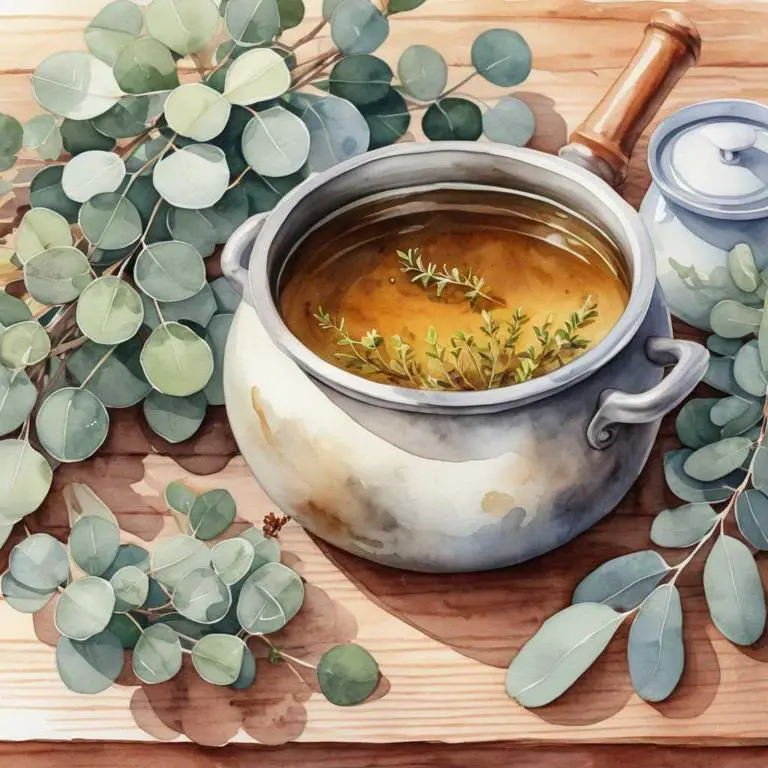
Herbal decoctions for bronchitis are a natural remedy made by steeping herbs in hot water to create a soothing liquid that helps alleviate symptoms of bronchitis, such as coughing and congestion.
These decoctions work by reducing inflammation, loosening mucus, and opening up airways, making it easier to breathe. Examples of herbal decoctions that help with bronchitis include thyme, ginger, and slippery elm, which have anti-inflammatory properties and can be consumed as a warm tea or added to a steam inhalation.
By using these decoctions, individuals with bronchitis can improve their quality of life by reducing symptoms and alleviating discomfort, allowing them to return to their daily activities with ease.
The following article describes in detail the most important decoctions for bronchitis, including medicinal properties, parts of herbs to use, and recipes for preparations.
- 1. Echinacea purpurea
- 2. Glycyrrhiza glabra
- 3. Althaea officinalis
- 4. Verbascum thapsus
- 5. Euphorbia esculenta
- 6. Taraxacum officinale
- 7. Aloe vera
- 8. Zingiber officinale
- 9. Cinchona officinalis
- 10. Petasites hybridus
- What is the best combination of herbal decoctions to use for bronchitis?
- What ailments similar to bronchitis are treated with herbal decoctions?
1. Echinacea purpurea
Purple coneflower decoctions helps with bronchitis because its active compound, triterpenoids, possesses potent anti-inflammatory properties that soothe irritated airways and reduce inflammation in the lungs.
The decoction's expectorant effects help loosen and clear out excess mucus, making it easier to expel and breathe more easily.
Additionally, the antiviral and antibacterial properties of purple coneflower may help combat underlying infections that contribute to bronchitis symptoms, providing relief from coughing, wheezing, and chest tightness.
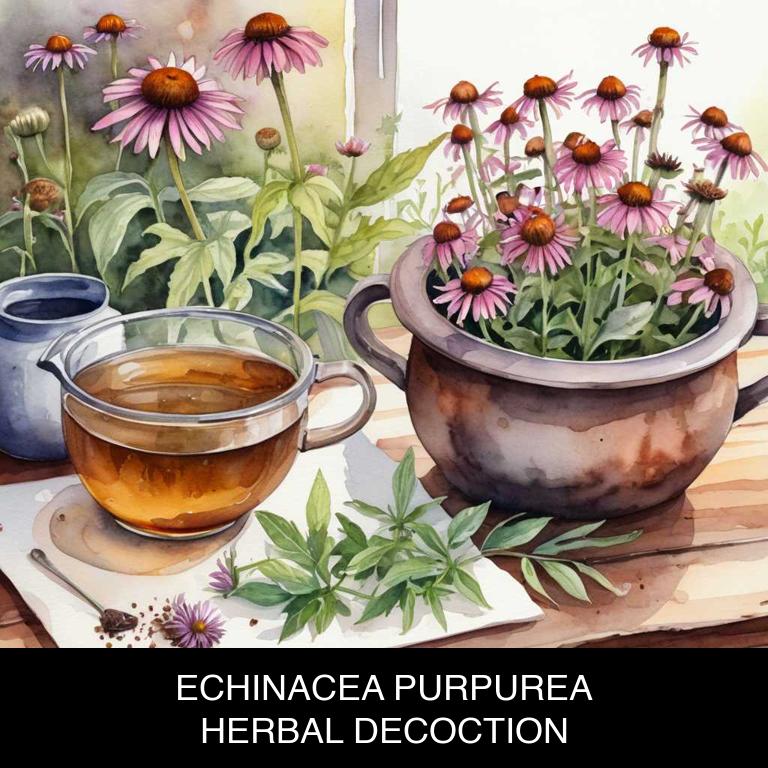
Medicinal Constituents
The list below shows the primary medicinal constituents in Echinacea purpurea decoctions that help with bronchitis.
- Alkylamides: Alkylamides in Echinacea purpurea decoctions have anti-inflammatory properties that can help reduce the severity of bronchitis symptoms by reducing inflammation in the airways.
- Cichoric acid: Cichoric acid, a phenolic compound, exhibits immunomodulatory effects that can help stimulate the immune system to fight off infections causing bronchitis, thereby reducing the duration and severity of the illness.
- Isobutylamides: Isobutylamides have been shown to possess anti-inflammatory and antioxidant properties that can help protect the respiratory system from oxidative stress and inflammation associated with bronchitis.
Parts Used
The list below shows the primary parts of purple coneflower used to make decoctions for bronchitis.
- Roots: They are rich in alkaloids, glycosides, and other compounds that have anti-inflammatory and immune-boosting properties.
- Leaves: They contain flavonoids, phenolic acids, and other compounds that exhibit antioxidant and anti-inflammatory effects.
- Stems: They are often used in combination with other parts, providing a richer and more complex mixture of bioactive compounds that aid in treating bronchitis.
Quick Recipe
The following recipe gives a procedure to make a basic purple coneflower for bronchitis.
- Harvest 2-4 ounces of fresh echinacea purpurea flowers and leaves in the summer months when they are in full bloom.
- Clean the harvested echinacea purpurea flowers and leaves thoroughly to remove any dirt or debris from the fields.
- Combine 1-2 teaspoons of the cleaned echinacea purpurea flowers and leaves with 1 quart of boiling water to create a decoction.
- Simmer the decoction for 5-10 minutes to allow the active ingredients to infuse into the water.
- Strain the decoction through a cheesecloth or a fine-mesh sieve to remove the solids before drinking.
2. Glycyrrhiza glabra
Licorice decoctions helps with bronchitis because it soothes and calms the inflamed airways, reducing coughing and congestion.
The glycyrrhizin present in licorice root has anti-inflammatory properties that help to reduce swelling in the respiratory tract, making it easier for mucus to drain out of the lungs. Additionally, licorice decoctions can help to loosen and clear out mucus, providing relief from bronchitis symptoms such as wheezing and shortness of breath.
Its expectorant properties also help to thin and expel mucus from the respiratory tract, further alleviating symptoms.

Medicinal Constituents
The list below shows the primary medicinal constituents in Glycyrrhiza glabra decoctions that help with bronchitis.
- Glycyrrhizin: This triterpenoid saponin has anti-inflammatory properties, which can help reduce inflammation in the airways and alleviate symptoms of bronchitis.
- Liquiritin: A phenolic compound, liquiritin has antioxidant properties that can help protect the respiratory system from oxidative stress and damage caused by inflammation, thereby aiding in the recovery from bronchitis.
- Isoliquiritigenin: A flavonoid, isoliquiritigenin has anti-inflammatory and immunomodulatory effects, which can help regulate the immune response and reduce inflammation in the respiratory tract, making it easier to breathe and recover from bronchitis.
Parts Used
The list below shows the primary parts of licorice used to make decoctions for bronchitis.
- Roots: The roots of Glycyrrhiza glabra are commonly used to make decoctions for bronchitis because they contain a high concentration of glycyrrhizin, a compound that has anti-inflammatory properties.
- Leaves: The leaves of Glycyrrhiza glabra are used in decoctions for bronchitis due to their expectorant properties, which help to loosen and clear mucus from the airways.
- Roots: The roots of Glycyrrhiza glabra are also used to make decoctions for bronchitis because they have been traditionally used to soothe and calm irritated bronchial passages, reducing inflammation and promoting healing.
Quick Recipe
The following recipe gives a procedure to make a basic licorice for bronchitis.
- Harvest glycyrrhiza glabra roots by digging them up in the fall or early spring when the plant is dormant.
- Wash the roots thoroughly with cold water to remove any dirt or debris from the harvesting process.
- Chop the roots into small pieces with a sharp knife or cleaver to release their active ingredients.
- Combine 10-20 grams of chopped glycyrrhiza glabra roots with 1 liter of water in a saucepan.
- Simmer the mixture over low heat for 30-40 minutes or until the liquid has reduced by half.
3. Althaea officinalis
Marshmallow decoctions helps with bronchitis because of its unique properties that soothe and protect the respiratory tract.
The mucilage present in marshmallow roots forms a protective barrier on the inflamed airways, reducing inflammation and discomfort. Additionally, the decoction's expectorant properties help loosen and clear out mucus, making it easier to cough up and breathe freely.
This natural remedy also reduces bronchospasm, allowing for more efficient oxygen intake and relief from bronchitis symptoms.
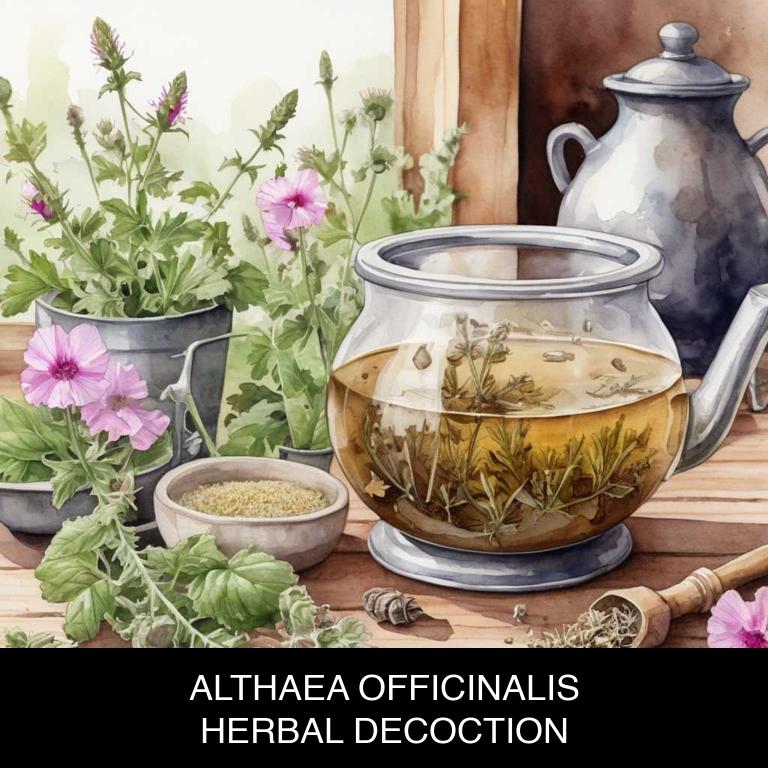
Medicinal Constituents
The list below shows the primary medicinal constituents in Althaea officinalis decoctions that help with bronchitis.
- Mucilages: Mucilages help to soothe and calm irritated bronchial passages, reducing inflammation and discomfort associated with bronchitis.
- Flavonoids: Flavonoids exhibit anti-inflammatory properties, which can help to reduce swelling and inflammation in the bronchial tubes, alleviating symptoms of bronchitis.
- Gallic acid: Gallic acid possesses antimicrobial and anti-inflammatory properties, which can help to combat infections and reduce inflammation in the bronchial passages, making it easier to breathe and alleviate bronchitis symptoms.
Parts Used
The list below shows the primary parts of marshmallow used to make decoctions for bronchitis.
- Roots: The roots are used due to their high mucilage content, which helps soothe and calm irritated bronchial tissues.
- Leaves: The leaves are used because they contain flavonoids and other compounds that help reduce inflammation and congestion in the bronchial passages.
- Barks: The barks are used as they contain tannins and other compounds that aid in reducing inflammation, relieving coughs, and promoting expectoration.
Quick Recipe
The following recipe gives a procedure to make a basic marshmallow for bronchitis.
- Measure out 2-4 teaspoons of dried root of althaea officinalis in a heat-resistant glass bowl.
- Combine the measured root with 1 cup of boiling water in the bowl.
- Reduce heat to a simmer and let the mixture steep for 5-10 minutes.
- Strain the decoction through a fine-mesh sieve into a clean glass container.
- Allow the decoction to cool to room temperature before refrigerating or consuming.
4. Verbascum thapsus
Mullein decoctions helps with bronchitis because its unique combination of compounds, such as saponins and flavonoids, have a soothing effect on the mucous membranes in the lungs.
This can help to reduce inflammation and relieve coughing spasms. Additionally, mullein's expectorant properties allow it to break down and loosen mucus, making it easier to expel and clearing the airways of congestion.
As a result, mullein decoctions have been traditionally used to provide relief from bronchitis symptoms such as wheezing, coughing, and chest tightness.
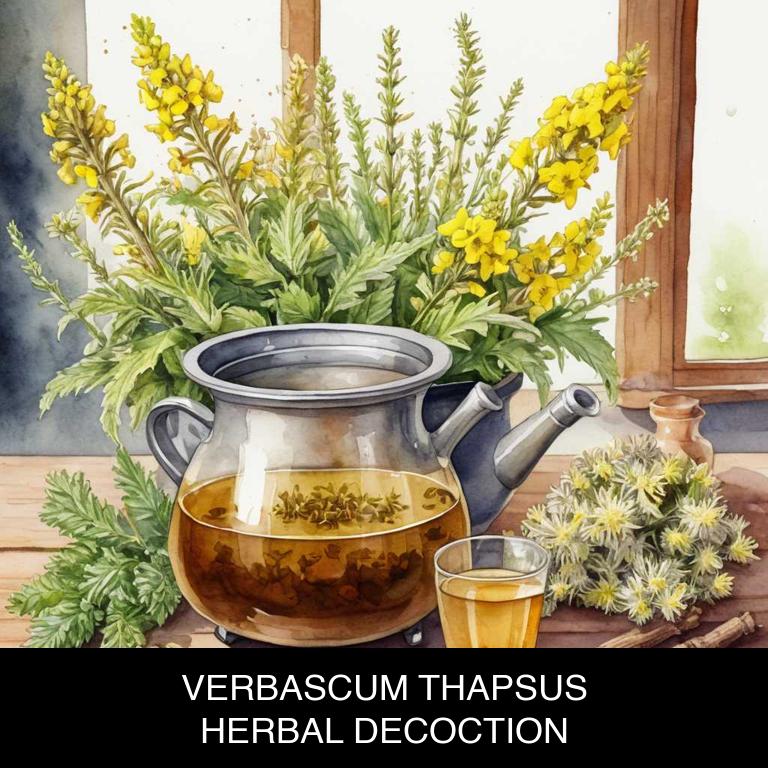
Medicinal Constituents
The list below shows the primary medicinal constituents in Verbascum thapsus decoctions that help with bronchitis.
- Phenylethanoid glycosides: These compounds help with bronchitis by exhibiting anti-inflammatory properties, which reduce swelling and congestion in the airways, making it easier to breathe.
- Saponins: Saponins in Verbascum thapsus have expectorant properties, helping to loosen and clear mucus from the lungs and airways, making it easier to cough up and relieve bronchitis symptoms.
- Flavonoids: Flavonoids present in the plant have antioxidant and anti-inflammatory effects, which help protect the airways from oxidative stress and inflammation caused by bronchitis, promoting faster recovery and reducing the severity of symptoms.
Parts Used
The list below shows the primary parts of mullein used to make decoctions for bronchitis.
- Leaves: They are rich in saponins and flavonoids, which have anti-inflammatory and expectorant properties that help relieve bronchitis symptoms.
- Roots: The roots contain mucilages and saponins, which soothe and protect the respiratory tract, reducing inflammation and cough.
- Stems: The stems of Verbascum thapsus contain mucilages and flavonoids that help to calm and soothe the respiratory tract, making it easier to breathe and reducing cough.
Quick Recipe
The following recipe gives a procedure to make a basic mullein for bronchitis.
- Gather 30-40 grams of fresh or dried verbascum thapsus flowers and leaves in a clean container for later use.
- Weigh the dried flowers and leaves and add 500ml of cold filtered water to a large pot.
- Boil the mixture at 100 degrees celsius for 10-15 minutes to release the active compounds.
- Strain the decoction through a cheesecloth or a fine-mesh sieve into a clean container.
- Store the cooled decoction in the refrigerator for up to 3 days and consume 100-200ml as needed.
5. Euphorbia esculenta
Wild potato decoctions helps with bronchitis because they contain antispasmodic properties that soothe and relax constricted airways, reducing coughing and wheezing.
The decoctions' anti-inflammatory compounds also help to reduce swelling in the lungs and airways, making it easier to breathe.
Additionally, the wild potato's expectorant properties help to loosen and clear out mucus and phlegm from the respiratory tract, further relieving congestion and discomfort associated with bronchitis.
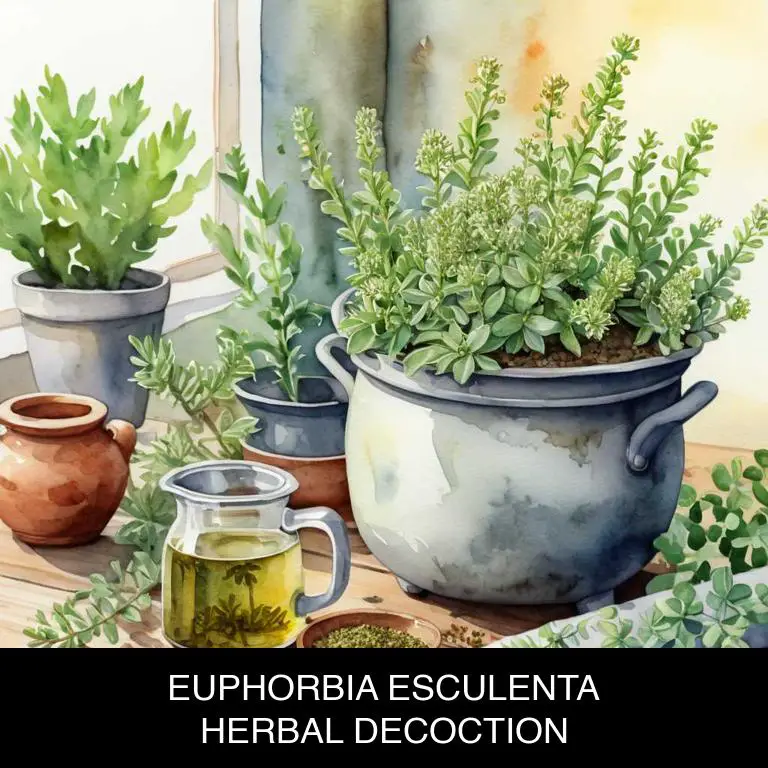
Medicinal Constituents
The list below shows the primary medicinal constituents in Euphorbia esculenta decoctions that help with bronchitis.
- Saponins: Saponins in Euphorbia esculenta decoctions help with bronchitis by reducing inflammation and suppressing cough, which are common symptoms of the condition.
- Flavonoids: Flavonoids in these decoctions may help alleviate bronchitis by their antioxidant and anti-inflammatory properties, which can help protect the respiratory system from damage caused by free radicals.
- Phenolic acids: Phenolic acids in Euphorbia esculenta decoctions may help with bronchitis by exhibiting antimicrobial properties that can inhibit the growth of pathogens that contribute to the condition.
Parts Used
The list below shows the primary parts of wild potato used to make decoctions for bronchitis.
- Roots: They are used due to their medicinal properties, which help in soothing bronchial inflammation.
- Leaves: They are used because they contain compounds that aid in reducing cough and congestion associated with bronchitis.
- Stems: They are used due to their ability to help in thinning mucus, making it easier to expel, providing relief from bronchitis symptoms.
Quick Recipe
The following recipe gives a procedure to make a basic wild potato for bronchitis.
- Gather 100g of dried euphorbia esculenta roots and 500ml of water in a clean saucepan.
- Bring the water to a boil over medium heat then reduce to a simmer for 10 minutes.
- Add 20g of the dried euphorbia esculenta roots to the simmering water and steep for 15 minutes.
- Strain the liquid through a cheesecloth or fine mesh into a clean container discarding the solids.
- Store the herbal decoction in the refrigerator for up to 24 hours before consumption.
6. Taraxacum officinale
Dandelion decoctions helps with bronchitis because of its unique combination of bioactive compounds that have anti-inflammatory, antiseptic, and expectorant properties.
The decoction's rich content of vitamins A, C, and E helps to soothe and protect the mucous membranes in the respiratory tract, reducing inflammation and discomfort caused by bronchitis. Additionally, dandelion's flavonoids and terpenes help to loosen and clear mucus from the airways, making it easier to breathe and relieving congestion.
This natural remedy has been traditionally used to alleviate symptoms of bronchitis, such as coughing, wheezing, and shortness of breath.

Medicinal Constituents
The list below shows the primary medicinal constituents in Taraxacum officinale decoctions that help with bronchitis.
- Saponins: These complex molecules help to reduce inflammation and relax the airway muscles, making it easier to breathe in individuals with bronchitis.
- Flavonoids: These phenolic compounds possess antioxidant properties, which can help to reduce oxidative stress and inflammation in the airways, alleviating symptoms of bronchitis.
- Polysaccharides: These complex carbohydrates stimulate the immune system, increasing the production of white blood cells and activating the body's natural defenses against infections that can cause bronchitis.
Parts Used
The list below shows the primary parts of dandelion used to make decoctions for bronchitis.
- Roots: They contain a high concentration of taraxasterol and other bioactive compounds that help alleviate bronchitis symptoms.
- Leaves: Rich in flavonoids, phenolic acids, and terpenoids, which have anti-inflammatory and expectorant properties to relieve bronchitis.
- Stems: They contain volatile oils and other compounds that help reduce inflammation and relieve respiratory issues associated with bronchitis.
Quick Recipe
The following recipe gives a procedure to make a basic dandelion for bronchitis.
- Harvest 20-30 leaves and roots of taraxacum officinale in the early morning for optimal potency.
- Rinse the harvested plants thoroughly with cold running water to remove any dirt or debris.
- Chop the plants into small pieces and combine them in a 1:10 ratio with boiling water to make decoction.
- Steep the plant mixture in boiling water for 5-10 minutes to release its active compounds.
- Strain the decoction through a cheesecloth or fine mesh into a clean container to remove solids.
7. Aloe vera
Aloe decoctions helps with bronchitis because they possess potent anti-inflammatory and mucolytic properties that soothe the respiratory tract, reducing inflammation and excess mucus production.
The decoction's expectorant effects help loosen and clear out trapped mucus, allowing for easier breathing and improved lung function. Additionally, aloe's antibacterial compounds can help combat underlying infections, promoting recovery from bronchitis and reducing symptoms such as coughing and wheezing.
By addressing these underlying issues, herbal aloe decoctions provide relief and support for the body during the recovery process.
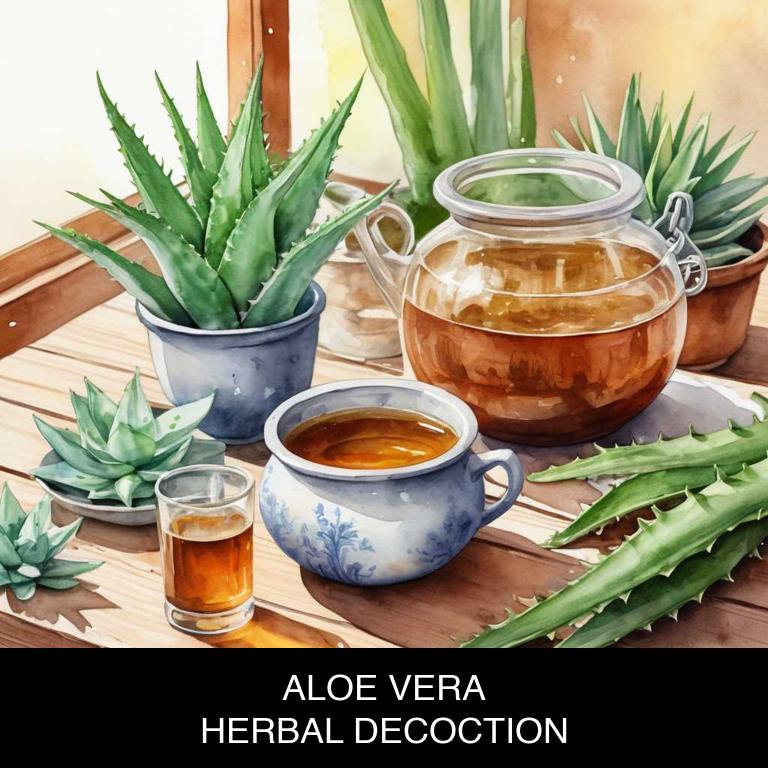
Medicinal Constituents
The list below shows the primary medicinal constituents in Aloe vera decoctions that help with bronchitis.
- Anthraquinones: These glycosides help reduce inflammation in the airways and mucous membranes, alleviating symptoms of bronchitis.
- Flavonoids: As antioxidants, flavonoids help protect lung tissues from oxidative damage caused by inflammation, thereby supporting recovery from bronchitis.
- Triterpenoids: These compounds exhibit anti-inflammatory and expectorant properties, helping to reduce mucus production and ease coughing in individuals with bronchitis.
Parts Used
The list below shows the primary parts of aloe used to make decoctions for bronchitis.
- Leaves: The gel from the leaves is used because it has anti-inflammatory properties that help soothe and calm the bronchial tubes.
- Leaves (juice): The juice from the leaves is used because it contains a high amount of vitamins and minerals that help to reduce inflammation and fight off infections in the respiratory system.
- Leaves (extract): The extract from the leaves is used because it contains a high concentration of aloin and aloe-emodin, which have been shown to have anti-inflammatory and antibacterial properties that can help to combat bronchitis.
Quick Recipe
The following recipe gives a procedure to make a basic aloe for bronchitis.
- Harvest 2-3 mature aloe vera leaves of equal size and store them in a cool dry place for later use.
- Cut the leaves into 2-inch pieces and soak them in water for 2 hours to soften the gel.
- Blend the softened aloe vera pieces with 1 cup of water in a blender for 1 minute.
- Strain the blended mixture through a cheesecloth or a fine-mesh sieve into a bowl to remove any pulp.
- Allow the decoction to sit at room temperature for 24 hours before using it as a topical treatment.
8. Zingiber officinale
Ginger decoctions helps with bronchitis because its natural anti-inflammatory properties soothe irritated airways, reducing coughing and congestion.
The warm liquid also thins mucus, making it easier to expel, thereby alleviating chest tightness and breathing difficulties. Additionally, ginger's expectorant qualities help loosen and clear out stubborn phlegm, promoting a quicker recovery from the infection.
By incorporating herbal ginger decoctions into your treatment plan, you can experience relief from bronchitis symptoms and breathe easier in no time.
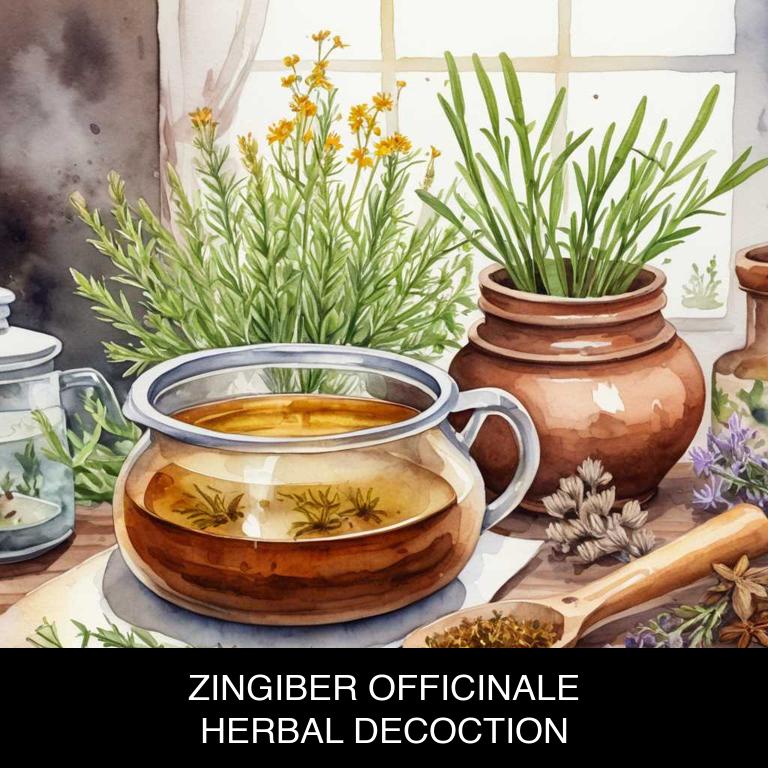
Medicinal Constituents
The list below shows the primary medicinal constituents in Zingiber officinale decoctions that help with bronchitis.
- Gingerols: Gingerols, specifically 6-gingerol and 8-gingerol, have anti-inflammatory properties that help reduce inflammation and alleviate symptoms associated with bronchitis, such as congestion and coughing.
- Shogaols: Shogaols, particularly 6-shogaol, exhibit bronchodilatory effects, which help relax the airway muscles and improve breathing in individuals with bronchitis.
- Zingiberene: Zingiberene, a sesquiterpene, possesses expectorant properties that help loosen and clear mucus from the lungs, making it easier to expel and alleviating symptoms of bronchitis.
Parts Used
The list below shows the primary parts of ginger used to make decoctions for bronchitis.
- Rhyzomes: They are the most commonly used part due to their high concentration of active compounds like gingerols and shogaols, which have anti-inflammatory and expectorant properties.
- Roots: Roots are another popular choice as they contain similar active compounds to rhyzomes, making them effective in relieving bronchitis symptoms.
- Leaves: While less commonly used, leaves are still used in some traditional decoctions due to their mild anti-inflammatory and antiseptic properties, which can help soothe respiratory issues.
Quick Recipe
The following recipe gives a procedure to make a basic ginger for bronchitis.
- Gather 1 to 2 teaspoons of dried zingiber officinale root and clean it thoroughly under cold running water.
- Combine the cleaned root with 8 ounces of water in a saucepan and bring to a boil.
- Reduce the heat to a simmer and continue cooking for 5 to 7 minutes or until the liquid reduces slightly.
- Strain the decoction through a cheesecloth or a fine-mesh sieve into a cup or container.
- Allow the decoction to cool to room temperature before consumption or refrigeration.
9. Cinchona officinalis
Jesuit's bark decoctions helps with bronchitis because it contains compounds that have a natural anti-inflammatory effect on the respiratory tract, reducing swelling and congestion in the airways.
The decoction also exhibits expectorant properties, helping to loosen and clear out mucus and other debris from the lungs and bronchi, making it easier to breathe.
Additionally, its antimicrobial properties help combat any underlying infections that may be contributing to the development of bronchitis, promoting a faster recovery.
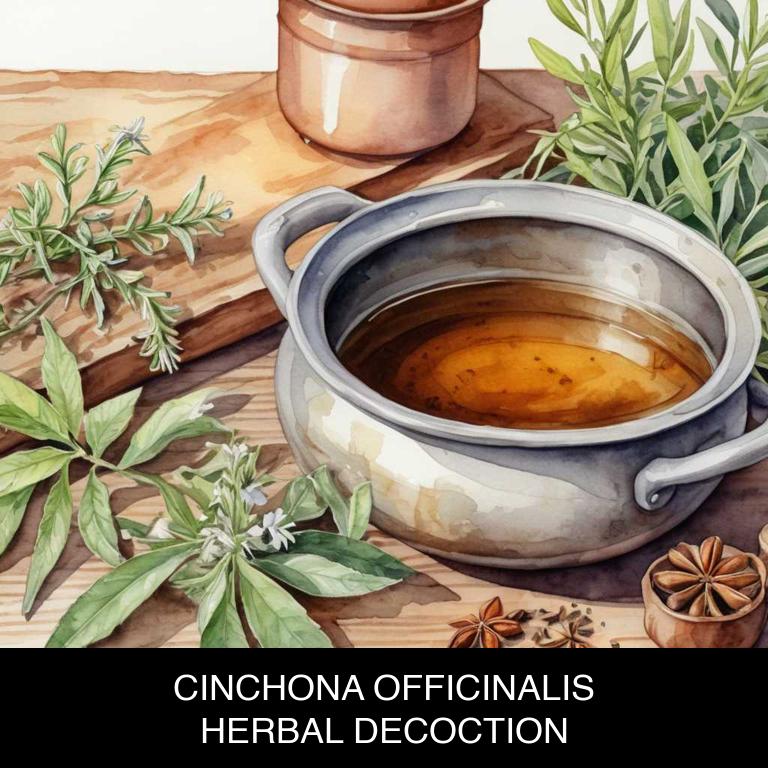
Medicinal Constituents
The list below shows the primary medicinal constituents in Cinchona officinalis decoctions that help with bronchitis.
- Quinine alkaloids: These compounds are known to reduce inflammation in the airways and help alleviate the symptoms of bronchitis by acting as a natural bronchodilator and anti-inflammatory agent.
- Quinic acid glycosides: These compounds have been shown to have expectorant properties, helping to loosen and clear mucus from the lungs, making it easier to breathe and reducing the severity of bronchitis symptoms.
- Quinovic glycosides: These compounds possess anti-inflammatory and antimicrobial properties, helping to reduce the severity of bronchitis by inhibiting the growth of bacteria and reducing inflammation in the airways.
Parts Used
The list below shows the primary parts of jesuit's bark used to make decoctions for bronchitis.
- Leaves: The leaves are the primary source of quinine, an alkaloid that helps to relieve cough and reduce fever in bronchitis patients.
- Barks: The barks of Cinchona officinalis contain various alkaloids, including quinine, which aid in reducing inflammation and relieving respiratory issues associated with bronchitis.
- Stems: The stems of Cinchona officinalis are also used to extract quinine and other alkaloids, which are then used in decoctions to help alleviate bronchitis symptoms.
Quick Recipe
The following recipe gives a procedure to make a basic jesuit's bark for bronchitis.
- Gather 20-30 grams of dried cinchona officinalis bark from a reputable supplier or harvest it sustainably.
- Grind the cinchona bark into a fine powder using a mortar and pestle for about 5 minutes.
- Combine 2-3 teaspoons of the ground cinchona powder with 1 liter of boiling water to create a decoction.
- Simmer the mixture for 10-15 minutes to extract the active compounds from the cinchona bark.
- Strain the decoction through a cheesecloth or a fine-mesh sieve into a clean container for consumption.
10. Petasites hybridus
Butterbur decoctions helps with bronchitis because it has a natural anti-inflammatory property that soothes irritated airways, reducing swelling and congestion.
The herbal remedy also exhibits expectorant properties, helping to loosen and clear mucus from the lungs and airways, making it easier to breathe.
Additionally, butterbur's antioxidants help protect the respiratory tract from further damage caused by free radicals, promoting healthy lung function and overall recovery from bronchitis.
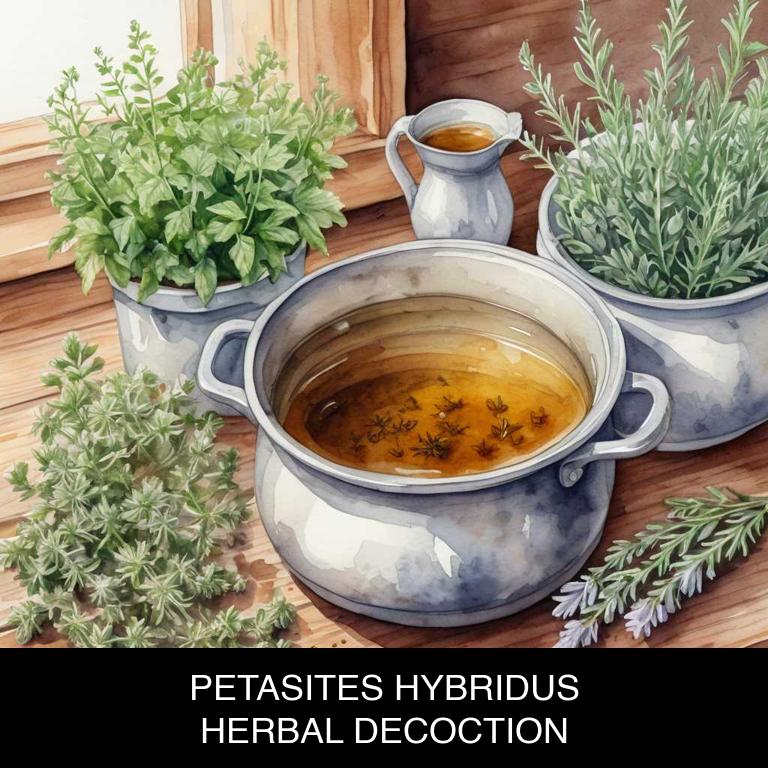
Medicinal Constituents
The list below shows the primary medicinal constituents in Petasites hybridus decoctions that help with bronchitis.
- Petasins: These sesquiterpene lactones have anti-inflammatory properties, which help to reduce inflammation in the airways and alleviate symptoms of bronchitis.
- Isopetasin: This sesquiterpene lactone exhibits bronchodilatory effects, causing the airways to relax and expand, making it easier to breathe for individuals with bronchitis.
- Petasol: This sesquiterpene exhibits anti-inflammatory and spasmolytic properties, helping to reduce inflammation and relax the smooth muscle in the airways, which can help to alleviate symptoms of bronchitis.
Parts Used
The list below shows the primary parts of butterbur used to make decoctions for bronchitis.
- Roots: They contain petasin and isopetasin, which are responsible for the anti-inflammatory and expectorant properties that help in alleviating bronchitis symptoms.
- Leaves: They are rich in antioxidants and have anti-inflammatory properties, which contribute to their effectiveness in treating bronchitis.
- Buds: They possess expectorant and anti-inflammatory properties, making them useful in relieving respiratory issues associated with bronchitis.
Quick Recipe
The following recipe gives a procedure to make a basic butterbur for bronchitis.
- Gather 30-60 grams of dried petasites hybridus roots and clean them thoroughly with a soft brush.
- Chop the cleaned roots into small pieces and store them in an airtight container for later use.
- Combine 1 teaspoon of chopped roots with 250ml of boiling water in a heat-resistant glass container.
- Steep the mixture for 10-15 minutes then strain it using a cheesecloth or a fine-mesh sieve.
- Discard the solids and store the cooled decoction in the refrigerator for up to 2 days.
What is the best combination of herbal decoctions to use for bronchitis?
The best combination of herbal decoctions that help with bronchitis is a blend of thyme, ginger, and licorice root.
Thyme is known for its antimicrobial properties, which help combat bacterial infections that can cause bronchitis. Ginger aids in reducing inflammation and soothing the respiratory tract. Licorice root provides anti-inflammatory relief and helps to thin mucus, making it easier to expel.
Drinking a decoction of these herbs can provide natural relief from bronchitis symptoms and support overall respiratory health.
What ailments similar to bronchitis are treated with herbal decoctions?
Ailments similar to bronchitis/decoctions.html">bronchitis/decoctions.html">bronchitis that are treated with herbal decoctions are chronic coughs, asthma, and pulmonary tuberculosis.
Decoctions made from herbs like marshmallow root, licorice root, and slippery elm help soothe and calm the respiratory tract, reducing inflammation and relieving congestion.
Other herbs like ginger, turmeric, and ephedra also aid in alleviating respiratory issues by thinning mucus and opening airways, promoting easier breathing.